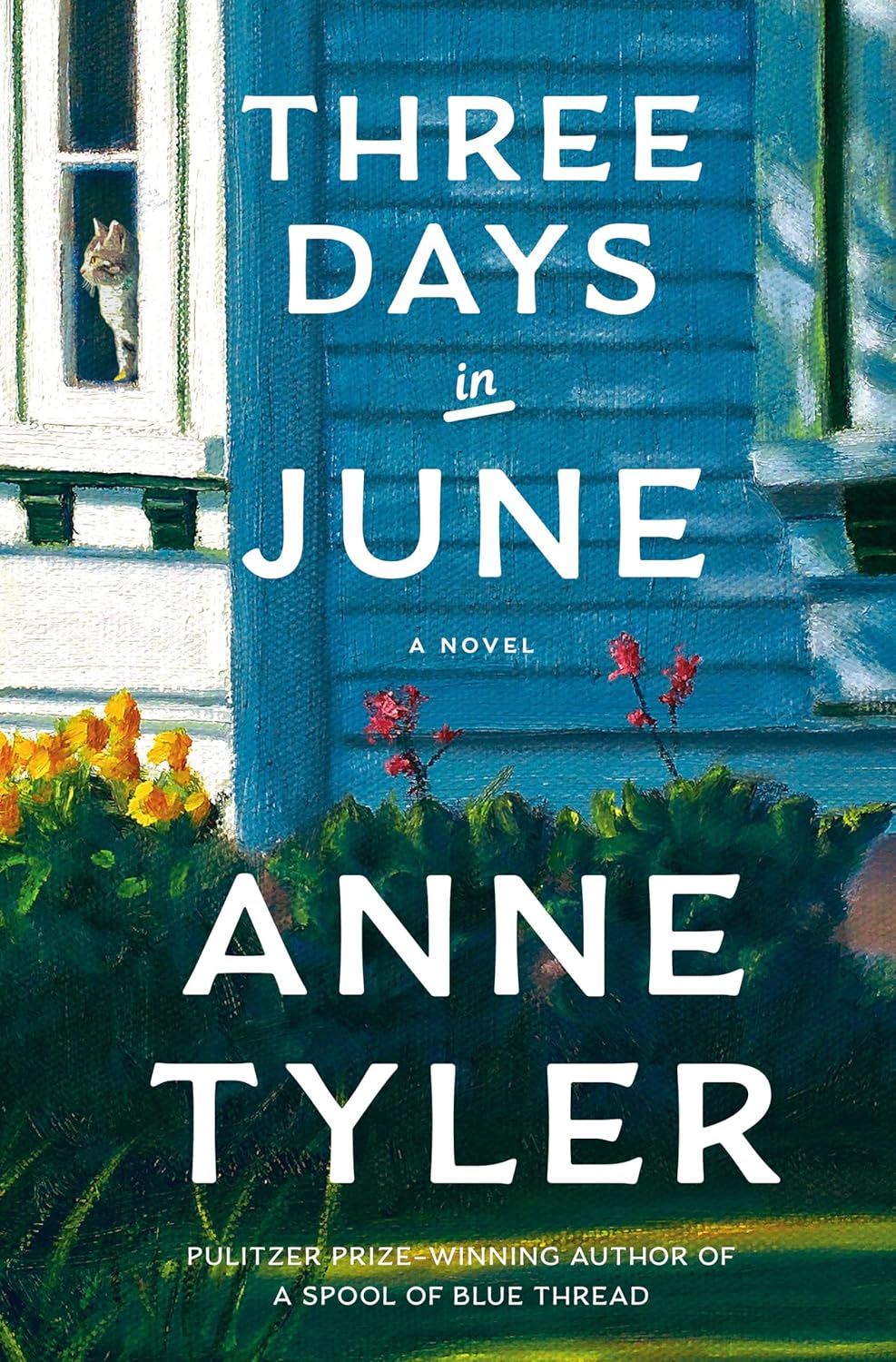Three Days in June: A Novel
- By Anne Tyler
- Knopf
- 176 pp.
- Reviewed by John P. Loonam
- February 27, 2025
A family’s hurts and happiness are recalled in this sentimental tale.

Anne Tyler is a cartographer of human behavior, often mapping the border between the simply idiosyncratic and the truly odd. Her characters are not made individual simply by her ability to explore the specifics of their everyday lives and relationships, though she certainly does that. Rather, she gives them actions and attitudes that stand out; they’re people who lead perfectly ordinary lives but have slightly extraordinary behaviors.
In her latest novel, Three Days in June, it is Gail Baines and her family who inhabit this landscape. Gail is the assistant director of a private girl’s school in Tyler’s beloved Baltimore. At least, she is until page seven, when she’s informed that not only will she not become headmistress when her boss retires, she won’t be asked to stay on by the incoming administration. At issue are her “people skills.” Gail is too blunt in her interactions, whether discussing the college potential of her students or the health of her peers.
It seems possible that the sudden change of career trajectory for a 61-year-old might take up a good deal of psychic space, but this job-losing personality assessment comes on the Friday of her daughter Debbie’s wedding weekend, so worrying about her future will have to wait — the wedding is enough to worry about.
Gail isn’t estranged from her daughter, but there is some distance between them. Debbie is kicking off her matrimonial festivities with a “Beauty Day” at a spa accompanied by her bridesmaids and future mother-in-law. Gail, although mother of the bride, is not invited, perhaps because she has zero interest in fashion, haircare, beauty products, or beauty itself.
When Max, Gail’s ex-husband and Debbie’s father, arrives at Gail’s apartment with his cat and needs a place to stay for the weekend, the stage (or page) is set for a busy couple days of confronting the past and contemplating the future.
Behind all these details, Tyler is exploring questions of life’s well-worn traditions, what Thoreau called the beaten track we make for ourselves. Max is the character most clearly living off that track. Since the split, he’s drifted from one teaching job to another, always working with needy students and therefore always underpaid. He’s blissfully unconcerned that he can’t afford a motel while in town. Gail understands that she only has a spare bedroom because she’s sought out promotions and the easier, slightly more lucrative confines of private schools. She wonders, however, given her recent news, whether she’s really better off than he is.
She’s also proud of the unconventional nuptials Debbie and Kenneth, the fiancé, are having. Debbie will wear green rather than white, and they aren’t employing a wedding planner. In fact, there’s little in the way of a wedding plan at all. Maybe the most entertaining character is Kenneth’s mother, Sophie, who is so unnerved by the laissez-faire approach to the ceremony that she takes to pulling index cards from her purse and reading aloud expert opinions on what should happen next.
There does come a point when the smooth inevitability of Debbie and Kenneth’s love is called into question, and their rift prompts a look at the history of Gail and Max’s marriage and divorce. It also allows Tyler to make clear that forgiveness is inextricably linked to individuality. As conflicts go, this one is quiet and short-lived.
The familiarity of these situations — family gatherings and weddings — makes the novel feel comfortable and ordinary, while the characters drive its entertainment value. In contrast to Sophie’s need for rules, we get Max, a self-proclaimed vegan who, over the course of events, eats cheese, fish, chicken, and prime rib. Then there’s his cat, who slinks about Gail’s place with feline arrogance, needing food, litter, and — we learn — a permanent home, since Max is only fostering her temporarily.
Gail tells us she’s not the type to dwell on the past, and sometimes she isn’t. When Kenneth’s uncle turns out to be the boyfriend she broke up with when she fell in love with Max, reappearing almost 30 years later as an entirely appropriate middle-aged prospect, she isn’t even a little interested. Yet throughout the weekend, she manages to rethink her entire existence and paint an exceptionally efficient portrait of her former life with Debbie and Max, from what drew them together to what’s now keeping them apart.
Questions of employment, health, marriage, divorce, forgiveness, and social convention are all at play, but none of the answers will come as a surprise to readers. It never seems likely that Gail might end up unemployed (or the cat homeless) after the weekend is over. Various plot twists — the tension between bride and groom, the appearance of the long-ago ex, even a health scare involving the headmistress firing Gail — are dealt with calmly and efficiently. Like scenic overlooks, they offer a bird’s-eye view of potential chaos without any real fear that we’ll get close to genuine tragedy.
When Gail makes her decisions at the end of the novel, the result is comfortable, satisfying, and unconventional, rather like her daughter’s wedding.
John P. Loonam has a Ph.D. in American literature from the City University of New York and taught English in New York City public schools for over 35 years. He has published fiction in various journals and anthologies, and his short plays have been featured by the Mottola Theater Project several times. He is married and the father of two sons; the four have lived in Brooklyn since before it was cool. His first novel, Music the World Makes, will be published by Frayed Edge Press in 2025, while a collection of his short stories, The Price of Their Toys, is forthcoming from Cornerstone Press.

